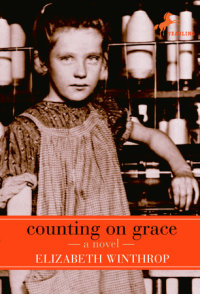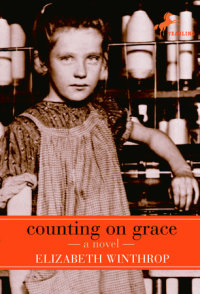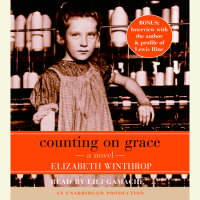Counting on Grace
1910. Pownal, Vermont. At 12, Grace and her best friend Arthur must leave school and go to work as a “doffers” on their mothers’ looms in the mill. Grace’s mother is the best worker, fast and powerful, and Grace desperately wants to help her. But she’s left handed and doffing is a right-handed job. Grace’s every mistake costs her mother, and the family. She only feels capable on Sundays, when she and Arthur receive special lessons from their teacher. Together they write a secret letter to the Child Labor Board about underage children working in Pownal. A few weeks later a man with a camera shows up. It is the famous reformer Lewis Hine, undercover, collecting evidence for the Child Labor Board. Grace’s brief acquaintance with Hine and the photos he takes of her are a gift that changes her sense of herself, her future, and her family’s future.
An Excerpt fromCounting on Grace
"Grace, your turn."
The book is called The Red Badge of Courage. I like that name. I stand up to read, but as soon as I open my mouth, my feet start moving. It always happens that way. I can't help it.
" 'The youth was in a little trance of astonishment. So they were at last going to fight.' Miss Lesley, why don't the youth have a name?"
"Why doesn't the youth have a name," Miss Lesley says, but I go right on. She's always trying to fix our grammar, but we don't pay much mind.
"The writer should call him Joe or Henry or something."
In the front row, my little brother, Henry, giggles. Miss Lesley touches his head with her hand and he stops. At least she don't smack him with that ruler of hers.
"Grace, sit down when you read."
"I can't. I don't read as good. When I sit my brain stops working."
"Nonsense. Your brain works just like everybody else's. I want you to stay in one place when you read. Stop hopping around the room. Look at Arthur. He can sit still. Now you try it."
Arthur's desk is hooked up to mine and he never moves a muscle 'cepting his lips when he's reading. That's why Miss Lesley likes him the best. It's not only 'cause he's the best reader. It's 'cause he's a sitter and the rest of us are hoppers, jumpers, fidgeters. Arthur's twelve too, but he's four months older than me. I can read just as good as him so long as I can move around at the same time.
I go on. "'He could not accept with asshur--'"
"Assurance," Miss Lesley says. "That means he could not believe. Henry, sit up and listen. Your sister's reading a story."
I finish the sentence. "'. . . he was about to mingle in one of those great affairs of the earth.'"
"Thank you, Grace. Please sit now. What do you think that means? Class?"
Arthur's hand goes up. Miss Lesley nods at him.
"The youth's going to be in a war."
"How do you know that?"
"I read ahead."
Arthur always reads ahead.
"And if you hadn't read ahead, Arthur?"
" 'Cause there are soldiers in the story. If there are soldiers, there's gonna be a war."
"Right. This is a story about the Civil War. Some of you children could have had grandparents who fought in that war."
"Not me," says Dougie. "My grandparents lived in Ireland."
"Me either," yells Felix. "My grandparents were born in Canada."
Miss Lesley claps her hands for silence. The whole time she's teaching, Miss Lesley moves around the room, keeping us kids in order. I'm back at my desk, but my feet are dancing underneath. Miss Lesley slaps them with her ruler whenever she passes by. I pretend I don't even feel it. Seems she cares more about sitting still than learning.
"You older children go on reading among yourselves now. One sentence each, then pass the book."
I hate that. I like to hear my voice doing the reading. Or Arthur's. Thomas mumbles so you can't understand him and Norma just pretends to read and Rose is too busy twirling her hair around her finger and staring at Thomas. I hate when the story goes too slow. Then I forget what's happening.
***
It's Arthur who's reading when we hear footsteps outside on the wooden porch, the thunk of a boot against the step to knock off the mud. We get still. The man coming through that door understands that Miss Lesley don't like dirt in her classroom.
We know who it is. We know what he's going to say. I sneak a peek at Arthur, who's put the book down. For once.
Miss Lesley has her ruler raised and suddenly she stops moving too.
The door opens. French Johnny pokes his head in first, almost like a little kid asking permission. He went to this schoolhimself. He knows how hard the benches can be after a day of sitting. He knows every hook by the door and the way the handle of the coal stove wriggles out and slams to the floor when someone ain't paying mind. French Johnny is the second hand at the mill. He's in charge of the spinning room where my mother runs six frames. He's come up the hill in his white apron to get a mill rat. That's what they call the kids who work in the mill. We all end up as mill rats.
"Yes?" Miss Lesley says with no respect in her voice. She might as well be talking to a second grader like my brother, Henry.
"Come for the boy," says French Johnny. He sounds like he don't want to be here. He knows she won't let this one go without a fight. Truth is she argues with him over every single one of us.
"Well, you can turn around and walk right out of here. You're not taking him," says Miss Lesley, keeping her back to barrel-bellied French Johnny. She's acting as if he's no bigger than one of those sow bugs come out of the woodwork this time of year. "Class, I want you to pay attention to the board. We're going to make the sound of these two letters." Her ruler smacks the CH. "Chuh," she says to the younger ones. "Repeat after me. Chuh."
But nobody says nothing. We're all waiting and watching French Johnny.
"Chuh," she says again, her voice rising. She's getting angry.
Nobody speaks.
I can't stand silence like that.
"Chuh," I say, and two of the little kids laugh.
French Johnny is all the way in the room now. He's squirmed around the door and closed it behind him.
He signals to Arthur, who pays him no mind.



